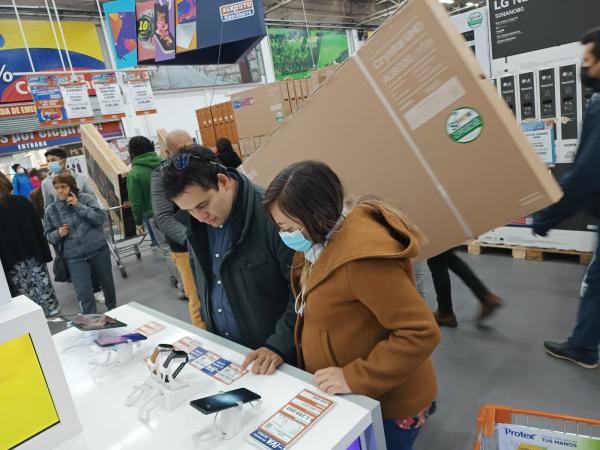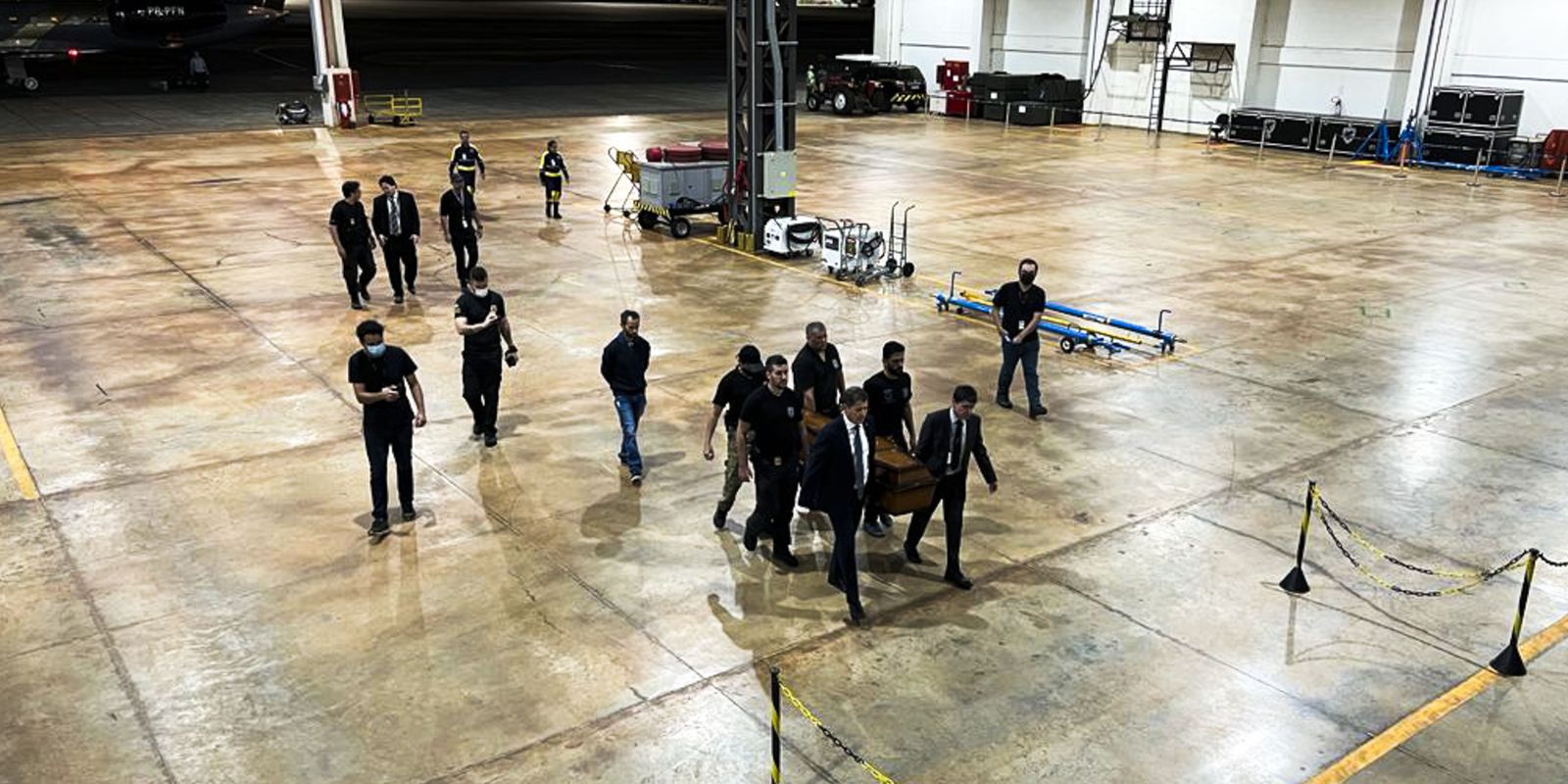“I have lived on the street since I was 11 years old, with that I tell you everything. My father kicked me out of the house because my mother died half an hour after I was born. According to him, I was to blame for his wife’s death, my mother”.
This is how Jorge Jara (67) begins telling his story of half a century outdoors. Today he lives in the Hogar de Cristo Shelter House located in San Bernardo; he is in a wheelchair due to osteoarthritis and arthritis that affects his knees. There, from a space that gives him warmth, bed, food and shelter, with a serene voice and a sweet smile, he recalls his thousand and one stories from half a century of his life walking and sleeping in various corners of Chile.
“It was his fault because my mom was all crushed inside. He was a country rooster, she drank. The doctors told him: save yourself or the bus, and she said to save the bus. It is a great sorrow that I have in my heart. In my heart, there is still a little boy”, continues Jorge, with a sad and sometimes broken voice, but hopeful in the psychological care that he will receive.
How were those first days on the street, being a child?
It was not easy. But first of all, I know Chile from end to end and everything by finger. Wherever the night caught me, I stayed to sleep. Up a tree, wherever the night caught me, I was thrown. I lived in Florida, in Concepción. From there my father kicked me out, I walked, I took a train to Santiago. He was sitting next to the driver. He told me: “where are you going?”. For Santiago, I told him. I arrived at the Central Station and started walking everywhere. Then I began to move to the north, to the south. Everything by finger
“I went through everything. Hardship, sadness, hunger, cold. When I go to a store and I see a child saying: ‘Mamita, I want a sweet’ and they throw themselves on the ground…´, I feel sorry! I tell the lady: ‘Give the child a sweet, I’ll pay for it’, because I imagine myself on the street. Going to a store asking for a pancito, a little thing to eat, ”she says.
According to the latest estimates handled by Hogar de Cristo, 19,000 people live on the streets in the country, most of them in the Metropolitan Region. During 2021, 9,977 people went through one of the 84 programs that the foundation has for this population in the country. According to the Ministry of Social Development, 91% live alone, as Jorge once was. Forty-four years is the average age of those who live in these conditions, but 41% indicated that their first experience occurred before the age of 18.
In the sewers of the Mapocho
Jorge was always alone. The street changed his character, he took away his childhood, but not his heart. “One hardens, I didn’t want to know about anyone, not even my brothers,” he says. Precisely, he never knew about his family. “My brothers did not exist. On top of that, my father got it into their heads that I wasn’t their brother,” he says.
“I had a puppy but later I kicked him out because I felt sorry for him. I said to myself: ‘I and this poor little animal are suffering. I didn’t have to feed him. So I wanted him to be free and look elsewhere. The puppies are also cold, they are wet, sleeping in the street just like one. I assembled my rucos in a safe place, where there were no other people. Forever Alone. Next to trees”, Jorge says about what it is like to live on the street, in the rucos, those small houses made of rubble. Precisely, he says that he collected his “walls” from the dumps. Him “He made them with pallets, a square two pallets high. And when he left me he left it there, for another person who needed it. Sometimes he slept in the Mapocho sewers. There he put pallets and slept, passing all the water under me ”.
Jorge does not have the fingers of his right hand and those of the left are crippled. “I had an accident. I am a furniture maker, I make all kinds of furniture, bookcases, dining rooms with chairs. upholstery I put a fourteen-inch blade on a handsaw to split a stick two by two. I pass the stick and suddenly it does a spin and boom. I felt no pain, at that time I felt nothing. I took the stick, turned it around and kept passing the stick. I’m done, I stop the machine and I see blood on the saw. I see my hand but not the fingers. They took me to the Trauma Hospital at 10 in the morning. I was until 6 in the afternoon waiting for them to attend to me. There the pain was unbearable.
Desperate because of the pain, he wanted to commit suicide until a doctor managed to hold him down before throwing himself on a soccer field. The doctor finally admitted him to the ward. “This was my second accident. The first was on this hand – it shows a cut across his left thumb – with the same saw. I took my two fingers and they put them in platinum. I think I would have taken the fingers of the other hand, they put them on me. But they would have been stiff.”
Are homeless people discriminated against in health services?
Totally discriminated against. The service is slow, but to the people on the streets it is a: “Leave it there no more”. For me that is a bad thing, because on TV they say that health is the best thing there is for everyone. And that is a big lie. It is not the same for everyone.
Can the new Constitution change this situation?
It’s not going to change. I give this president a few months. He refused us two ten percent, which is our money. I have no faith in this gentleman, he is not going to change anything. He will continue everything the same or worse. Now there are 12-year-olds assaulting vehicles with knives, hammers, and pistols. Where was that seen before? With guns, doing robberies. Before there was more respect. Now you go out, you don’t know if you’re going to come back or how you’re going to come back. That’s why I don’t give it more than three months, I told my colleagues.
“And with the Constitution, education and health will not change. It will stay the same or worse. In the same schools the children fighting, with knives. There is a lack of stricter education and that schools check them at the entrances. Just like in prisons, where after half an hour, the criminals are already free”.
I am a free soul
In 2009, Hogar de Cristo identified the existence of a specific group of people over 60 years of age, regularly participating in hostels who, due to their health situation, frailty and dependency, required specialized and permanent support. This, product of the deterioration of the time spent on the street, the disconnection with social networks, health and, in some cases, the presence of problematic consumption of alcohol or other drugs, making them a highly vulnerable population. Based on this reality, the foundation implements the “Shelter Houses” as an alternative for this group of older adults, who require support that goes beyond an emergency service. One of them is San Bernardo, where Jorge lives. He can be there indefinitely, having a roof, bed, food and all kinds of care.
Jorge never returned to Florida. “I made the cross for him.” He also did not marry, nor did he have children because he did not want to repeat the story of his father. “I didn’t want to because making a child suffer like they made me suffer, better not.” He studied at a night school, being able to level up to first grade, and did military service in the high mountains. “I lived on the street until I was 60 years old. Then I was only in hostels. Because when there was a big snowfall here, I was still out on the street and my ruco was no more than three zinc plates. I was in Casas Viejas, in Puente Alto, by the river. That was my last ruco. They went three times to look for me from a shelter, but I, the stubborn one, said no, no and no”.
Why didn’t he want to go?
For Liberty. In the street I got up and went wherever I wanted. In a shelter it was no longer going to be the same. It was being locked up and that was what I didn’t like. They controlled everything, the time of going to bed, getting up and that was what I didn’t like. I am a free soul. I wanted to go to the shelter when I woke up and saw a space like this, no more than the zinc plate that had not snowed and everything else with snow. She looked and thought, ‘how am I going to get out of here?’ and he was more numb than the geek. Any cold. They came and told me: ‘Are you going with us?’ I told them yes altiro. I got there and they put a stove, coffee, they were worried about me. They took me to the doctor in case something was going to happen to me from the humidity of the snow. But he had nothing. I really am a tough person. Fifty years on the street, all my life.
What was the most difficult of those 50 years?
The hardest thing is food and things to sleep. Eat and then at night go to bed. He missed a warm bed and a cup of tea at night. That was not there and that is what one misses. People who live on the streets ask for food, but I could move around and go to the dumps to collect copper wires. He peeled them and sold them. With that he ate, drank. I am a drinker. I don’t take a day or a week. For me, a tomato plant is day and night for a whole month. It’s not wine or anything, it’s pure strong.
The famous wire stripper?
No, I bought rum. Of those by the liter in the liquor stores. I took the wire stripper once and never again. At the age of 11 I started trying alcohol. Alcohol kills the cold. One is desperate and one drinks to stay well, not to be so cold.
Has the street changed in these 50 years?
Much. Before there was not so much evil, violence. Now if I stayed on the street, I would be fearing that they would kill me. Or that they burn my ruco, while I’m sleeping and can’t get out. Before, he lived more calmly.








